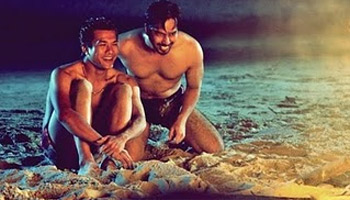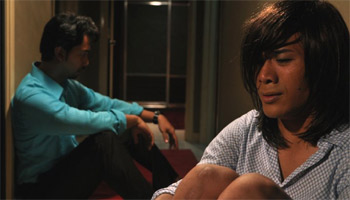News of the controversial movie started making its rounds more than a year ago. Dalam Botol, which is dubbed Malaysia's first ‘gay-themed’ romance movie, had producers worried that its ‘gay’ theme may suffer at the hands of the country’s censors and repel audiences. But as it turns out, the latter fear is unfounded.
According to local media reports, the film's producer Raja Azmi Raja Sulaiman said Dalam Botol has made slightly more than RM 1 million (US$330,500) in five days since it opened in theatres on March 24 surpassing its production and marketing costs of RM970,000.
The Malay-language film revolves around two men, one of whom undergoes a sex change to become a woman to please his lover although ‘she’ later regrets her decision when he falls in love with a woman.

Directed by Khir Rahman, Dalam Botol (In a Bottle) is said to
be Malaysia's first feature film with 'gay' lead characters. It stars
Arja Lee whose character has a sex-change procedure in a
misguided attempt to please his lover.
Censorship issues
Originally titled Anu Dalam Botol (Penis In A Bottle), producers had to drop the offending word after the censorship board objected. According to a report published in the New York Times last year, the producer said the final version was approved after she agreed to several changes after meeting with the board. She was also advised not to include intimate bedroom scenes.
While the censors may allow kissing and sex scenes in locally released foreign films, Malaysian-made films are generally not allowed to do so. “In any Hollywood film, kissing is part of the culture,” explained Mohammad Hussain, chairman of the Film Censorship Board, in the Times. “We [in Malaysia] don’t go on kissing in public so we don’t allow that to be portrayed in our local films,” he added.
In early 2010, Malaysia eased film censorship guidelines to allow the depiction of gay characters – provided they either repent or “become” straight. Sodomy and oral sex is criminalised under sections 377A and 377B of the Malaysian Penal Code and is punishable by up to 20 years in prison and caning.
Producer Raja Azmi says she hopes the film would send a clear message to the public about gay culture. “Dalam Botol is my way of preaching to remind society not to be influenced with gay culture that is taboo in this country," she was quoted as saying in an interview on the state-run Bernama Radio24 programme "Kerusi Panas" on Tuesday night.
But in the UK's Guardian newspaper, she revealed that the story is based on a true story of a friend who regretted having a sex-change procedure. She said: "If my film has a message, it's please don't change yourself for love. My friend has suffered so much, and I don't want other people to suffer like him."

Reactions from Malaysia’s LGBT community
While the film is regarded to be a breakthrough and often referred to as Malaysia’s Brokeback mountain by the media, members of Malaysia’s LGBT community are not embracing it as such.
“Is the protagonist gay or transsexual? I can’t tell, and it seems, neither could he/she.” Prominent commentator Pang Khee Teik wrote in a review on Loyarburok.com. He is referring to one of the main character’s decision to undergo a sex reassignment surgery to become a woman although it appears that he doesn’t identify as transgender, one of the main points of contention of the film.
The movie “totally mixes up sexual orientation and gender identity,” transgender activist Yuki Choe tells Fridae. It erroneously conveys to viewers that “one half of a gay male couple wants to or would eventually become a transsexual female and/or transsexual females are gay men and vice versa.”
The movie also reinforces a commonly held stereotype that gay men are “confused heterosexuals and they will finally regret, repent and change once they find the right girl.”
While Pang acknowledges that Dalam Botol is not representative of gay or transgender experiences in Malaysia, he says he “completely supports the right of filmmakers to represent their own stories just as he supports the right of characters to make stupid choices.”
Acknowledging that filmmakers in Malaysia have to be more creative when faced with strict censorship guidelines, Pang suggests that an alternative reading of the film may be required. “Interestingly, the regret expressed by the main character at the end of the film does not really amount to repentance. The character never really repented, he just got even more ‘emo’ than he already was. The slippage between regret and repentance makes this film quite subversive. Really.”
But on a more practical level, Pang says the film also serves as a plain reminder that “more education and empowerment is needed so that people who are going through such issues don’t make hasty choices.”
“With proper counselling, it is possible that the protagonist may understand he is just a gay man – a gay man is a man, no need to reassign his sex. Or if she does identify as a woman, perhaps she could understand the consequences so she doesn’t regret it later.”
If you have watched the film, what are your thoughts of Dalam Botol? Despite its flaws, do you think the film will create opportunities for more discussion and understanding of sexualty-related issues in Malaysia?
